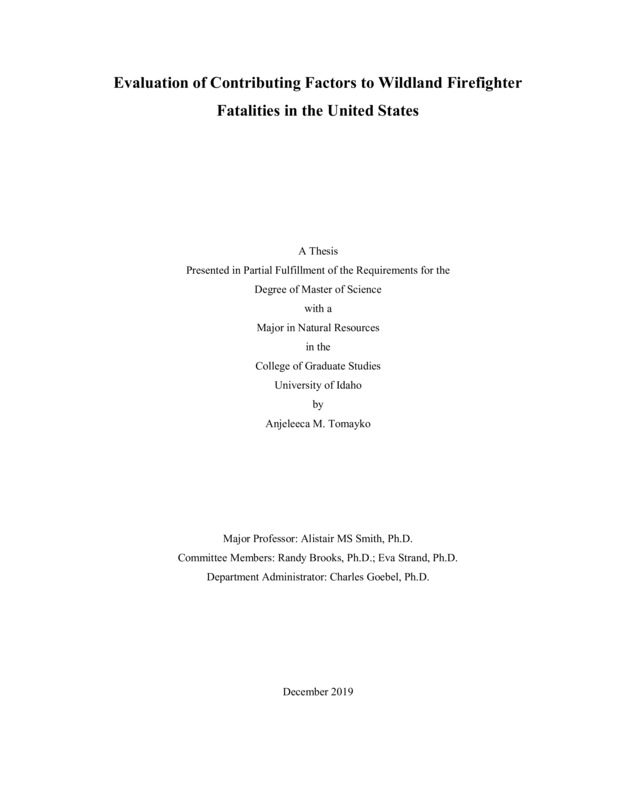Evaluation of Contributing Factors to Wildland Firefighter Fatalities in the United States
Tomayko, Anjeleeca. (2019-12). Evaluation of Contributing Factors to Wildland Firefighter Fatalities in the United States. Theses and Dissertations Collection, University of Idaho Library Digital Collections. https://www.lib.uidaho.edu/digital/etd/items/tomayko_idaho_0089n_11749.html
- Title:
- Evaluation of Contributing Factors to Wildland Firefighter Fatalities in the United States
- Author:
- Tomayko, Anjeleeca
- ORCID:
- 0000-0003-3767-2241
- Date:
- 2019-12
- Keywords:
- wildland fire wildland fire management wildland firefighter fatalities wildland urban interface
- Program:
- Natural Resources
- Subject Category:
- Natural resource management
- Abstract:
-
Wildland firefighter fatalities are not caused by one single factor. Catastrophic fires are on the rise, civilian and firefighter deaths are on the rise, particularly volunteer firefighters. The WUI is growing at a faster pace than ever recorded and suppression and economic costs are skyrocketing. There is not one contributing factor, thus there is not one solution. Also, a solution is not a one time occurrence. We must become adaptively resilient, living with fire on the landscape. We cannot extirpate wildfire, however we can learn to use it to our benefit through the use of increased prescribed fire to reduce fuel loading from dead and down woody debris, also reducing insect populations and the spread of diseases. We need to acknowledge the commitment and sacrifice wildland firefighters make in an effort to save our livelihoods. Livelihoods many of us have chosen to build in well documented fire prone areas. Better surveillance systems are needed to track statistics and implement better strategies and technologies. A universal human resource program with standardized job titles, a well-defined career path designed for retention and promotion and health and wellness programs is needed. The data surrounding the effects of poor nutrition, inconsistent fitness programs, insufficient sleep, and arduous working conditions points to a long term effect on today’s firefighters. Wildland firefighting is becoming increasingly dangerous and overly demanding resulting in an alarming rate of suicide. There is no top-down or bottom-up approach to this issue. As a society, through poor management decisions, poor policy making, and insufficient knowledge on the environment we are living in, we have created our own worst case scenario, a ticking time bomb, that’s showing itself through statistics. It will take each and every one of us at every level to collaborate, and implement innovative and adaptive solutions.
- Description:
- masters, M.S., Natural Resources -- University of Idaho - College of Graduate Studies, 2019-12
- Major Professor:
- Smith, Alistair
- Committee:
- Strand, Eva ; Brooks, Randy
- Defense Date:
- 2019-12
- Identifier:
- Tomayko_idaho_0089N_11749
- Type:
- Text
- Format Original:
- Format:
- application/pdf
- Rights:
- In Copyright - Educational Use Permitted. For more information, please contact University of Idaho Library Special Collections and Archives Department at libspec@uidaho.edu.
- Standardized Rights:
- http://rightsstatements.org/vocab/InC-EDU/1.0/

